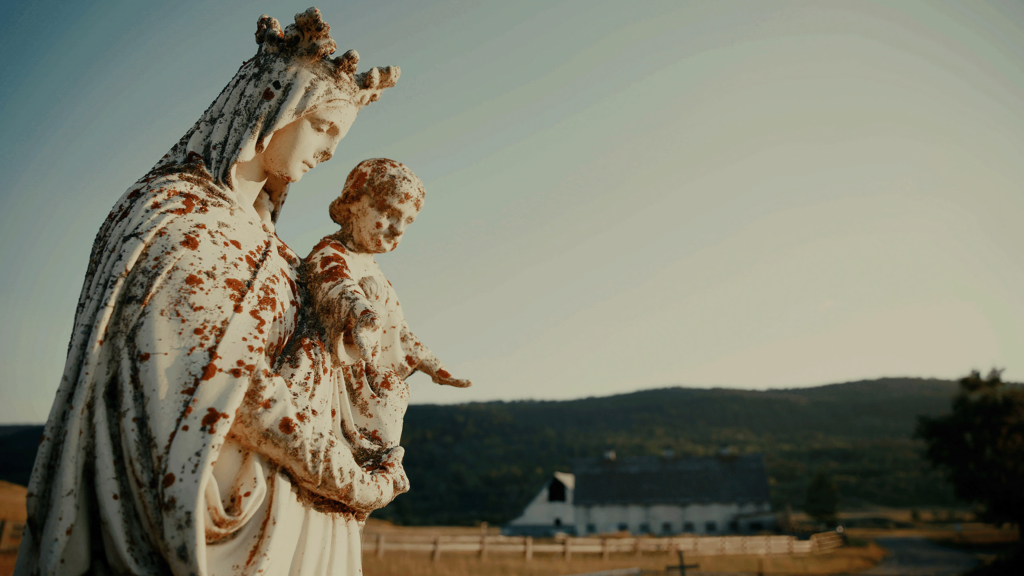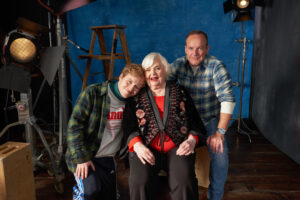By Jessica Herndon
Most filmmakers will agree that there is nothing like that instant when the lights dim in a theater and their work illuminates the room for the first time. The following moments often spark a spectrum of emotions accentuated by a deeper appreciation of what it took to make their project. For Sean Wang (Dìdi (弟弟)), Julian Brave NoiseCat and Emily Kassie (Sugarcane), and Josh Margolin (Thelma), those occasions occurred at the 2024 Sundance Film Festival when each premiered their debut feature. While at the Festival, the filmmakers also gathered at the Canon Creative Studio for Sundance Collab’s Making Your First Feature Film to talk about their movie-making process.
Creating a film is layered for Margolin, whose comedy Thelma is about a 93-year-old woman who sets out to recoup $10,000 she lost to a phone scammer. “In the best-case scenario, it’s exhausting and rewarding, but tiring and hard and stressful,” he says. And it’s worth it, which is evident from the smile on Margolin’s face as he lists off the roller coaster of feelings.
Below are some highlights from the conversation, which Sundance Collab course and events director Patty West moderated.
On finding the story:
Wang always liked films like Stand By Me, Ratcatcher, and The Sandlot because they reminded him of himself and his friends when they were growing up. But it occurred to him “that in those types of movies that I love, I haven’t seen the version that actually stars me and my friends,” he says. His debut, Dìdi (弟弟), about a 13-year-old Taiwanese boy growing up in Fremont, California, in the early 2000s, filled that void. Despite Wang noting that the coming-of-age genre is oversaturated, he refused to be deterred. “Every little specific thing you add to that story, that character is what then gets it to a tipping point of like, Oh, this now all of a sudden feels like a story we’ve never seen before because it’s so specific,” notes the filmmaker, whose movie won the Audience Award: U.S. Dramatic and U.S. Dramatic Special Jury Award: Ensemble at the 2024 Festival.
The making of Sugarcane, a documentary about intergenerational trauma following the abuse of segregated Indigenous children, was inspired by the 2021 discovery of hundreds of unmarked graves on the campuses of former Indian residential schools across Canada. “My family’s connection to these schools is a very deep and painful one,” says the film’s co-director NoiseCat, who added that St. Joseph’s Mission, the school featured in the movie, was where his family was sent, and his father was born.
Sugarcane co-director Kassie, a Canadian filmmaker and investigative journalist who reports on human rights abuses, met NoiseCat when they both worked at The Huffington Post. Moved by NoiseCat’s storytelling abilities, Kassie looked for more ways to work with him. When news of the unmarked graves was released in 2021, she knew this was the right story to document on film with NoiseCat. “We were both called to do this together,” she says of the film, which won the Directing Award: U.S. Documentary at the 2024 Festival. “This film, we see as a catalyst for change.”
Writer-director Margolin was inspired to make Thelma after his grandmother was almost scammed out of money by someone who was pretending to be him on the phone. “Seeing her duped in this way and get really taken advantage of was unsettling to me. And it started my wheels turning,” says the filmmaker. “And I’ve always had an affinity for action movies,” he adds. “Something about taking some of those tropes or those ideas and trying to shrink them down to an everyday size and explore them through the lens of a 93-year-old woman trying to get across a city felt like a really exciting way to pay homage to my grandma’s strength and her fight for her autonomy.”
On selecting collaborators:
For his central characters, Wang chose trained actors. But for all the other roles in his film, he went the street casting route, aiming to find kids who “captured that feeling of adolescent boyhood that was crass and loud and irreverent and punk, but also emotional and quiet,” he says. “I was always like, I think the kids that should be in this movie, that are right for this movie, probably have never thought about acting,” he adds. He not only cast newbies but hired a casting crew who had never cast a feature but specialized in street casting. They searched for kids at skate parks, schools, and basketball camps and hosted open casting calls. Wang also cast his 94-year-old grandmother, who had never acted before, and says he loves the way the two energies and worlds of the trained and first-time actors collide.

Kassie reveals that she and NoiseCat sought out to self-fund Sugarcane. “I took my savings and Julian threw some in too, and I was producing a loan for the first six months,” she says. “And then we got a first offer in and I realized I was way in over my head and had no idea what I was doing.” Kassie then reached out to award-winning documentary producer Kellen Quinn, whom Sugarcane DP Christopher LaMarca recommended to help guide the project. After seeing some of the early footage of the doc, he was in and became what Kassie calls the leader of the team.

Securing producers Zoë Worth and Chris Kaye for Thelma was a no-brainer for Margolin, who’d shared his script with his longtime friends in their writer’s group. “It was a very safe feeling,” he remembers. “It can be really vulnerable to bring work anywhere, and especially something that you’ve written that is drawing from your own life. And I felt just so connected to them in that moment and their reception of it. And they wanted to lean in and really loved the script and encouraged me to keep going with it. It was really meaningful.”

On the lessons they learned along the way:
Learning to let people help you out during the filmmaking process was one of the biggest lessons for Wang while making Dìdi (弟弟). “If I didn’t allow the people around me to help me and lean on them, I would burn out really, really quickly,” he says. “The scariest and most exciting part for me with this feature was I had never worked with an editor prior,” adds Wang, who edited all of his previous projects but hired Arielle Zakowski to edit Dìdi (弟弟). Wang says his nitpicky nature made him reluctant to relinquish his project to another editor. But Zakowski came through during their nearly one-month edit, which Wang remembers as “the sprint of my life.”
NoiseCat took cues from Kassie and learned to “really go all in,” he says. For Kassie’s part, she discovered, “If you wanna make a film like this, you have to live the story,” she says. “Live the story, be there, be present, stay the whole time, stay until the story’’s done. Know who the people are, connect with them, give it everything you have.”
Margolin says, “Follow the thing you love.” He recalls working on a lot of projects in the past but says Thelma “was the first project that I leaned into as something that felt personal and something that I felt really, really passionate about. The process is long and has its ups and downs, and you need enough love in the tank for the thing you’re doing to carry you through it.”
Dìdi (弟弟), acquired by Focus Features, is currently in theaters. Sugarcane, picked up by National Geographic Documentary Films, is playing in select theaters in New York and Los Angeles. Thelma, sold to Magnolia Pictures, is available to watch online stream. Watch the full discussion and Q&A for more from the first-time filmmakers, including how long it took to get their movies made. And sign up for Sundance Collab’s weekly newsletter here for updates on upcoming Collab events, courses, and discussions.










